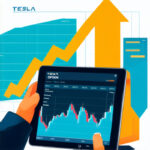Understanding the Tesla Share Market: Key Factors Driving Stock Prices

Introduction to the Tesla Share Market
The Tesla share market is a captivating topic for investors and enthusiasts alike, as it represents one of the most dynamic and talked-about sectors in the global stock market. Tesla, Inc., under the leadership of visionary Elon Musk, has redefined the electric vehicle (EV) industry, not only in terms of technology but also in how stocks can capture public imagination. Understanding the Tesla share market is crucial for investors looking to make informed decisions, as it involves analyzing various factors that drive stock prices. This blog post aims to delve into these factors and provide a comprehensive understanding of Tesla’s stock dynamics.
Overview of Tesla’s Position in the Market
Tesla has established itself as a formidable player in the automotive industry, particularly in the EV sector. As a pioneer in electric vehicles, Tesla’s innovative approach and technological advancements have set it apart from traditional car manufacturers. The company’s commitment to sustainability and cutting-edge technology has helped it gain a significant market share globally. Tesla’s position in the market is further solidified by its strong brand recognition and loyal customer base, which continue to drive demand for its products. This strong market position is a key factor in the fluctuations seen in the Tesla share market.
Importance of Understanding Stock Prices
Understanding stock prices, especially in the context of the Tesla share market, is essential for both seasoned investors and newcomers. Stock prices reflect the market’s perception of a company’s value and future potential, influenced by a myriad of factors. By grasping the elements that drive Tesla’s stock prices, investors can make more informed decisions and better manage the risks associated with their investments. Additionally, understanding these dynamics helps in identifying potential opportunities for growth and capitalizing on market trends, ultimately contributing to more strategic investment decisions in the volatile yet promising EV sector.
Brief History of Tesla’s Market Performance
Tesla’s market performance has been nothing short of remarkable, characterized by significant growth and volatility. Since its initial public offering (IPO) in 2010, Tesla’s stock has experienced dramatic price swings, often driven by technological breakthroughs, production milestones, and market expectations. The company’s ability to consistently exceed delivery targets and introduce innovative products has contributed to its rising stock prices. However, Tesla’s journey has not been without challenges, including production delays and regulatory hurdles. Despite these obstacles, Tesla’s resilience and ability to adapt have sustained investor confidence, making it a compelling case study in the share market.
Key Factors Influencing Tesla Share Prices
Impact of Technological Innovation
Technological innovation is a cornerstone of Tesla’s success and a primary driver of its share prices. The company’s relentless pursuit of cutting-edge technology, from autonomous driving capabilities to battery advancements, continues to capture market attention and investor interest. Tesla’s ability to innovate not only enhances its product offerings but also sets industry standards, pushing competitors to keep pace. As new technologies emerge, they create excitement and speculation in the market, often leading to fluctuations in Tesla’s stock prices. Thus, staying ahead in technology is crucial for Tesla to maintain its competitive edge and drive its share market performance.
Influence of Government Policies
Government policies play a significant role in shaping the Tesla share market, particularly those related to environmental regulations and incentives for electric vehicles. Supportive policies, such as tax credits and subsidies, can bolster Tesla’s sales and positively impact its stock prices. Conversely, changes in regulations or the reduction of incentives can pose challenges. Additionally, Tesla’s global operations mean it must navigate varying regulatory landscapes, which can influence production and market strategies. Keeping abreast of policy changes and their potential impact on Tesla is essential for investors seeking to understand the company’s stock performance in different geopolitical contexts.
Competitive Landscape in the EV Sector
The competitive landscape in the EV sector is intensifying, with numerous automakers entering the market, each vying for a share of the growing demand for electric vehicles. Companies like NIO, Rivian, and traditional automakers transitioning to EVs pose significant competition to Tesla. This competition affects Tesla’s market share and, consequently, its stock prices. While Tesla remains a leader due to its brand strength and technological prowess, the competitive pressures require continuous innovation and strategic positioning. Investors must consider the evolving competitive landscape to assess Tesla’s future growth prospects and its ability to sustain its share market performance.
Internal Factors Affecting Tesla’s Stock
Financial Performance and Earnings Reports
Tesla’s financial performance and earnings reports are critical internal factors influencing its stock prices. Positive earnings surprises or beating market expectations can lead to an increase in stock prices, reflecting investor confidence in the company’s profitability and growth potential. Conversely, missed targets or underperformance can lead to stock price declines. Investors closely scrutinize Tesla’s financial statements, looking at revenue growth, profit margins, and cash flow to gauge the company’s financial health. Understanding these financial metrics is crucial for investors to assess the sustainability of Tesla’s business model and its impact on stock market performance.
Management Decisions and Leadership
Management decisions and leadership are pivotal in shaping Tesla’s strategic direction and, consequently, its stock prices. Elon Musk, Tesla’s CEO, is known for his ambitious vision and ability to drive innovation. His leadership style and decisions, from product launches to strategic partnerships, significantly influence investor sentiment. Additionally, the management team’s ability to execute plans and address challenges, such as production bottlenecks or supply chain disruptions, impacts the company’s market perception. Investors closely monitor leadership decisions, as they provide insight into Tesla’s future trajectory and the potential risks and opportunities in the share market.
Production and Supply Chain Management
Production and supply chain management are critical components affecting Tesla’s ability to meet market demand and maintain stock prices. Efficient production processes and a robust supply chain are essential for Tesla to scale operations and deliver vehicles on time. Any disruptions, such as shortages of key components or logistical challenges, can lead to delays and impact stock prices negatively. Conversely, improvements in production efficiency or successful expansion of manufacturing capabilities can enhance investor confidence and boost stock prices. Understanding these operational aspects is vital for investors seeking to gauge Tesla’s ability to sustain growth and its impact on the share market.
External Economic Indicators
Global Economic Conditions
Global economic conditions significantly impact the Tesla share market, as they influence consumer spending, investment flows, and overall market sentiment. Economic downturns or geopolitical tensions can lead to reduced consumer demand for high-ticket items like electric vehicles, affecting Tesla’s sales and stock prices. Conversely, economic growth and stability create a favorable environment for increased investment and consumer spending, positively influencing Tesla’s market performance. Investors must consider global economic indicators, such as GDP growth, trade policies, and geopolitical developments, to understand their potential impact on Tesla’s stock market dynamics and future prospects.
Interest Rates and Inflation
Interest rates and inflation are critical economic factors that affect the Tesla share market by influencing borrowing costs and consumer purchasing power. Rising interest rates can increase the cost of financing for both Tesla and its customers, potentially dampening sales and impacting stock prices. Inflation, on the other hand, can erode consumer purchasing power and lead to higher production costs, affecting profit margins. However, inflation can also drive demand for assets like stocks as hedges. Investors should closely monitor monetary policy and inflation trends to assess their potential impact on Tesla’s financial performance and stock market valuation.
Currency Exchange Rates
Currency exchange rates are important for Tesla, given its global operations and the need to manage cross-border transactions. Fluctuations in exchange rates can impact Tesla’s revenue and profitability, especially in key markets outside the United States. A strong dollar may lead to higher costs for foreign buyers, affecting sales, while a weaker dollar can boost international revenue. Tesla’s ability to effectively manage currency risks and optimize its global operations plays a crucial role in maintaining stable stock prices. Investors should consider exchange rate trends to understand their potential effects on Tesla’s financial performance and share market dynamics.
Investor Sentiment and Market Trends
Role of Media and Public Perception
The role of media and public perception is significant in shaping investor sentiment and influencing the Tesla share market. Media coverage, whether positive or negative, can sway public opinion and impact stock prices. High-profile announcements, product launches, or controversies often attract media attention, leading to volatility in Tesla’s stock. Social media platforms also play a crucial role in disseminating information and shaping perceptions. Investors should be aware of media narratives and public sentiment, as they can drive short-term market trends and affect long-term investment strategies in Tesla’s volatile share market.
Influence of Institutional Investors
Institutional investors, such as mutual funds, pension funds, and hedge funds, have a significant influence on the Tesla share market due to their substantial investment power. Their buying or selling actions can lead to large price movements and impact overall market sentiment. Institutional investors often conduct in-depth analyses and can shape market perceptions through their investment decisions. Understanding the role of institutional investors and their strategies is crucial for retail investors, as it provides insights into potential market trends and the factors driving Tesla’s stock prices. Monitoring institutional activity can help investors align their strategies with broader market movements.
Retail Investor Behavior
Retail investor behavior is increasingly influential in the Tesla share market, driven by the rise of online trading platforms and increased access to market information. Retail investors often bring diverse perspectives and can contribute to stock price volatility through speculative trading and collective actions, such as those seen in meme stocks. Understanding the motivations and strategies of retail investors, including their reactions to news and market events, is essential for gauging Tesla’s market dynamics. As retail participation grows, it highlights the importance of considering both institutional and retail influences in developing a comprehensive view of Tesla’s share market performance.
Regulatory and Environmental Factors
Emissions Standards and Green Policies
Emissions standards and green policies are critical regulatory factors affecting the Tesla share market, as they directly impact the demand for electric vehicles. Stricter emissions regulations and incentives for sustainable transportation can boost Tesla’s sales and positively influence stock prices. Conversely, changes in policy direction or regulatory challenges can pose risks. Tesla’s commitment to sustainability aligns with global environmental goals, enhancing its appeal to eco-conscious consumers and investors. Understanding the regulatory landscape and its implications for the EV sector is vital for investors seeking to assess Tesla’s growth potential and market positioning.
Regulatory Approvals and Compliance
Regulatory approvals and compliance are essential for Tesla’s operations and expansion plans, affecting its stock market performance. Obtaining necessary permits and meeting compliance standards is crucial for Tesla to introduce new products and enter new markets. Delays or challenges in regulatory approvals can impact production timelines and investor confidence, leading to stock price fluctuations. Conversely, successful compliance and approvals can enhance Tesla’s market reputation and support growth. Investors must stay informed about regulatory developments and Tesla’s ability to navigate them, as they play a significant role in shaping the company’s future prospects and share market dynamics.
Impact of Environmental Initiatives
Environmental initiatives significantly impact the Tesla share market, as they align with the company’s mission to accelerate the transition to sustainable energy. Tesla’s focus on renewable energy solutions, such as solar products and energy storage, expands its market opportunities and enhances its appeal to environmentally conscious investors. These initiatives also position Tesla as a leader in addressing climate change, potentially attracting government support and subsidies. Investors should consider the impact of Tesla’s environmental initiatives on its long-term growth and stock market valuation, as they contribute to the company’s strategic positioning and competitive advantage in the evolving green economy.
Future Outlook for the Tesla Share Market
Predictions for Market Growth
The future outlook for the Tesla share market is optimistic, driven by the growing demand for electric vehicles and the company’s continuous innovation. Analysts predict substantial market growth as Tesla expands its product lineup and increases production capacity to meet global demand. The company’s advancements in battery technology and autonomous driving also present significant opportunities for future growth. However, navigating competitive pressures and regulatory challenges will be crucial. Investors should consider these growth predictions alongside potential risks to make informed decisions about Tesla’s stock, recognizing the dynamic nature of the EV market and its impact on Tesla’s share performance.
Potential Challenges and Opportunities
Potential challenges and opportunities in the Tesla share market are multifaceted, reflecting the complexities of the EV industry. Challenges include increasing competition, supply chain disruptions, and evolving regulatory landscapes. However, opportunities abound in the form of expanding global markets, technological advancements, and increased consumer adoption of sustainable transportation. Tesla’s ability to leverage its brand strength, innovation, and strategic partnerships will be key to overcoming challenges and capitalizing on opportunities. Investors should remain vigilant of these dynamics, assessing both risks and growth potential to align their investment strategies with Tesla’s evolving market position and future prospects.
Long-Term Investment Considerations
Long-term investment considerations for the Tesla share market involve evaluating the company’s strategic vision, financial resilience, and market positioning. Tesla’s commitment to innovation and sustainability positions it well for continued growth, but investors must weigh this against potential risks, such as market volatility and competitive pressures. Diversifying investments and maintaining a long-term perspective can help mitigate risks and capitalize on growth opportunities. Understanding Tesla’s business model, leadership, and industry trends is crucial for long-term investors seeking to navigate the complexities of the EV sector and maximize returns in the ever-evolving Tesla share market.
Conclusion
Summary of Key Insights
In conclusion, understanding the Tesla share market involves analyzing a myriad of factors, including technological innovation, government policies, financial performance, and investor sentiment. The dynamic nature of the EV sector, coupled with Tesla’s unique market position, presents both opportunities and challenges for investors. By staying informed about internal and external influences, investors can make more informed decisions, navigating the complexities of Tesla’s stock market performance. As the industry evolves, ongoing analysis and strategic insights will be essential for maximizing investment potential and mitigating risks in the Tesla share market.
Importance of Ongoing Market Analysis
Ongoing market analysis is crucial for investors in the Tesla share market, given the rapid pace of change in the EV sector and broader economic environment. Continuous monitoring of market trends, regulatory developments, and technological advancements provides valuable insights into potential impacts on Tesla’s stock performance. Investors should remain adaptable, adjusting strategies as new information emerges and market conditions evolve. By prioritizing ongoing analysis, investors can better anticipate shifts in the Tesla share market, aligning their investment decisions with emerging opportunities and challenges, ultimately enhancing their ability to achieve long-term financial goals.
Final Thoughts on Investing in Tesla
Investing in Tesla offers a compelling opportunity to participate in the transformative EV industry, driven by innovation and sustainability. However, it requires careful consideration of the various factors influencing the Tesla share market, from competitive dynamics to regulatory changes. Investors should maintain a balanced perspective, weighing potential risks and rewards, and adopting a long-term approach to capitalize on growth opportunities. By staying informed and adaptable, investors can navigate the complexities of the Tesla share market, making strategic decisions that align with their financial objectives and contribute to a sustainable investment portfolio.

Laura Henderson is an enthusiast and has been writing on cutting-edge topics for years.







